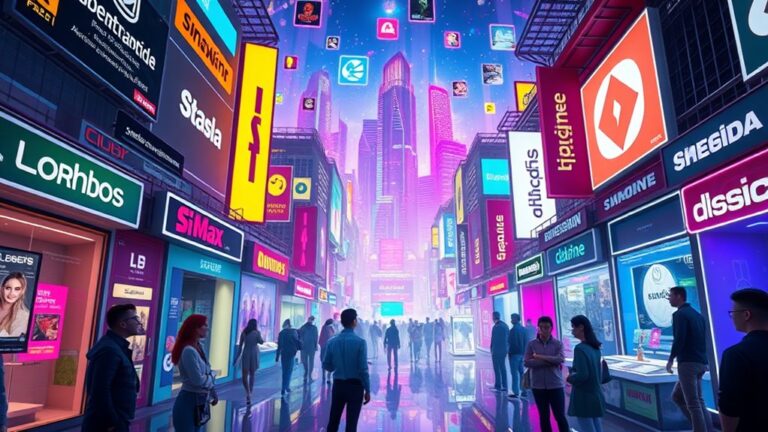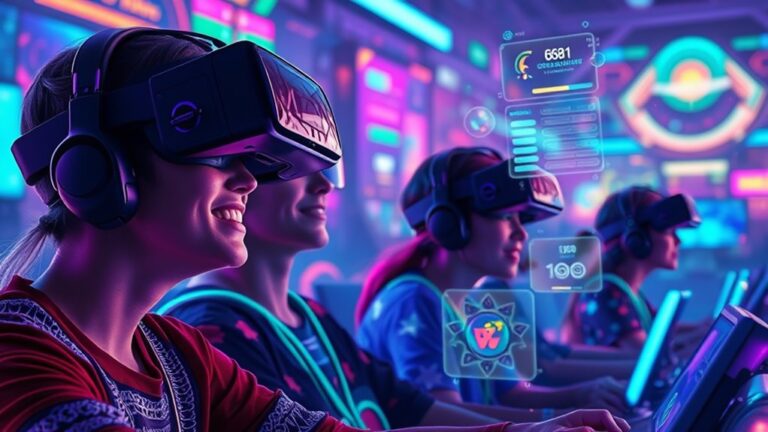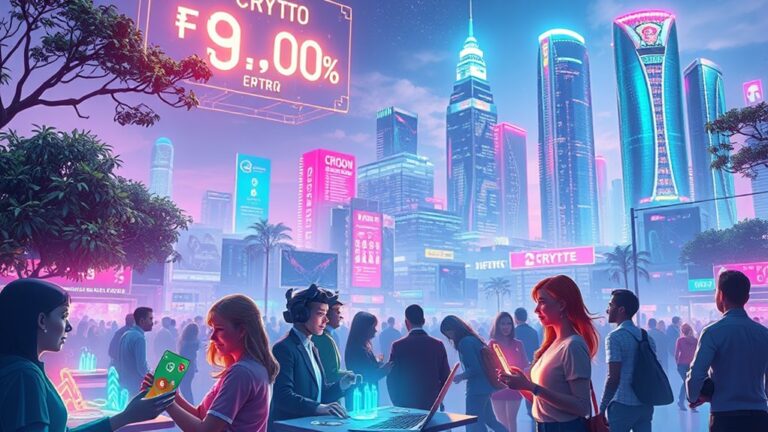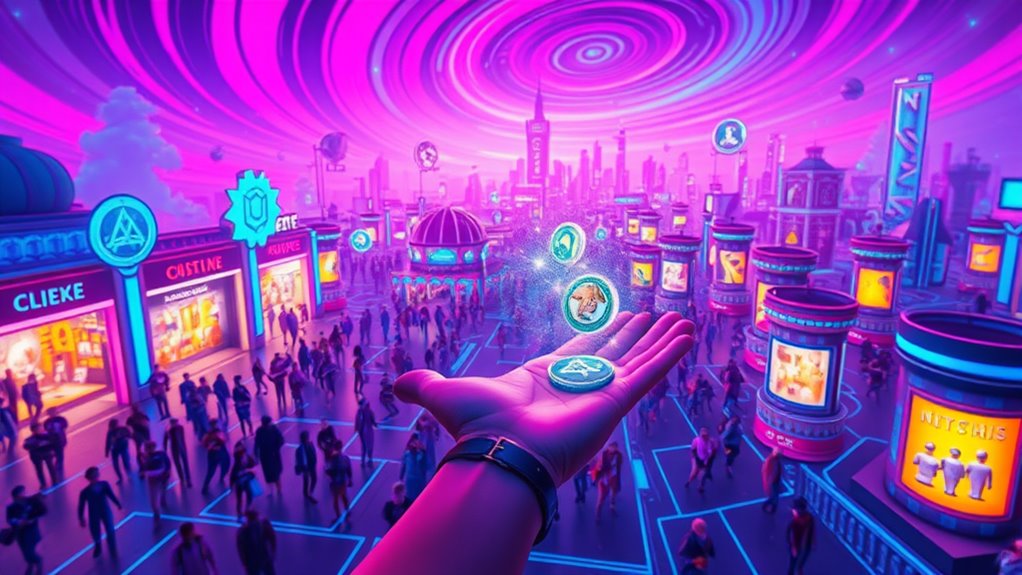
How NFTs Play a Role in the Metaverse: Unlocking Digital Ownership
NFTs are essential in the metaverse as they establish digital ownership over unique assets, such as virtual art and collectibles. This ownership is secured through blockchain technology, which guarantees authenticity and prevents duplication. NFTs enable secure economic transactions, allowing users to buy, sell, and trade digital items. Additionally, they contribute to personal identity by allowing users to create unique avatars and collections. Understanding these dynamics reveals much about the evolving digital landscape.
Key Takeaways
- NFTs ensure unique digital assets like art and collectibles, enhancing identity and exclusivity in metaverse environments.
- Ownership of NFTs is secured through blockchain, preventing duplication and facilitating transparent economic transactions.
- Digital avatars and virtual real estate NFTs allow users to express individuality and establish consistent online identities.
- Smart contracts automate transactions and royalties, promoting transparency and accountability within the NFT ecosystem.
- The growing NFT market fosters community engagement and social interaction through unique collections and virtual events.
Understanding NFTs and Their Significance in the Metaverse

As digital landscapes evolve, the significance of non-fungible tokens (NFTs) in the metaverse becomes increasingly apparent. NFTs represent unique digital assets, ranging from virtual art to collectible items and virtual property. Each NFT is distinct, ensuring that ownership is clearly defined and cannot be duplicated.
This uniqueness contributes to the sense of identity and exclusivity within virtual environments, allowing users to express themselves through their digital possessions. Additionally, NFTs facilitate economic transactions, enabling users to buy, sell, and trade these assets securely.
The Function of Blockchain Technology in NFT Security

Blockchain technology underpins the security of non-fungible tokens (NFTs) by providing a reliable framework for their creation, ownership, and transfer. Its decentralized nature reduces the risk of manipulation, making it difficult for any single entity to control or alter NFT data.
The immutability of blockchain guarantees that ownership and transaction histories remain permanent and unchangeable. Additionally, cryptographic methods protect NFTs against unauthorized access and duplication.
Smart contracts facilitate secure transactions by automatically enforcing ownership rules without intermediaries. Transparency allows anyone to verify ownership and authenticity, enhancing trust. Furthermore, the unique metadata that proves ownership of each NFT is securely stored on the blockchain, ensuring that its authenticity can always be verified.
Despite vulnerabilities in smart contracts and risks associated with phishing, best practices like cold storage and multi-factor authentication further strengthen NFT security within this innovative ecosystem.
Exploring Different Types of NFT Assets

In the metaverse, NFTs encompass a variety of unique digital assets, with two prominent categories being digital artworks and virtual real estate.
Digital artworks represent ownership of original pieces created by artists, often traded on platforms dedicated to showcasing their value.
Meanwhile, virtual real estate ownership allows users to buy and develop parcels of land in digital environments, expanding opportunities for creativity and investment.
Unique Digital Artworks
Unique digital artworks have transformed the landscape of art ownership and creation, providing artists with innovative ways to share their work. NFTs, or non-fungible tokens, guarantee the authenticity and rarity of these pieces. Various categories of digital art NFTs include profile pictures (PFPs), one-of-one artworks, and generative art, each offering unique opportunities for artists and collectors. Below is a table summarizing different types of NFT assets:
| NFT Category | Description | Example Projects |
|---|---|---|
| PFPs and Avatars | Symbolize digital identity | CryptoPunks |
| One-of-One Artworks | Unique pieces with a single owner | Beeple’s “Everydays” |
| Generative Art NFTs | Created by algorithms, each piece is unique | Art Blocks |
| Photography NFTs | Monetize unique moments | Foundation |
| Music NFTs | Artists retain control over their music | Audius |
Virtual Real Estate Ownership
As the metaverse continues to evolve, virtual real estate ownership has emerged as a significant aspect of digital life, enabling users to buy, sell, and develop properties in these immersive environments.
Non-fungible tokens (NFTs) represent ownership of virtual real estate, such as parcels of land and buildings, secured on the blockchain. Users acquire these properties using cryptocurrencies, with values influenced by location and user traffic.
Platforms like Decentraland and The Sandbox provide avenues for purchasing and developing virtual real estate. Additionally, NFT assets can include avatars, virtual buildings, and rights to unique experiences, enriching the metaverse.
As interest in digital spaces grows, virtual real estate offers a new frontier for investment and community interaction, reshaping how individuals engage online.
The Economic Impact of NFTs in the Digital Marketplace

How are NFTs reshaping the economic landscape of the digital marketplace?
NFTs, or non-fungible tokens, utilize blockchain technology to secure ownership of digital assets, ensuring authenticity and preventing tampering. They represent various digital items, including art, gaming assets, and virtual real estate, creating value through scarcity.
The growing demand for digital art has considerably boosted the NFT market, contributing to its economic impact. Decentralized platforms facilitate trading, allowing users greater control over digital ownership.
Additionally, NFTs have the potential to revolutionize economic models by generating new revenue streams. Overall, the emergence of NFTs is transforming the digital marketplace, paving the way for innovative business approaches and enhancing economic activities across various sectors.
NFTs as a Tool for Digital Identity and Reputation
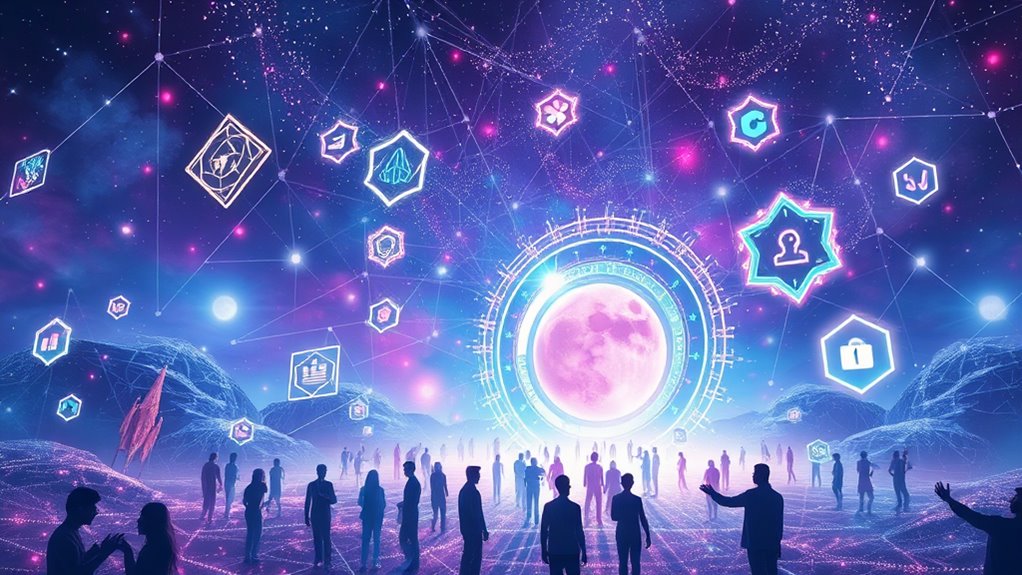
Digital identity and reputation in the metaverse are increasingly shaped by the use of NFTs, which provide users with a means to express themselves and establish their presence in virtual spaces.
Through NFTs, users can create and customize digital avatars that reflect their personal style and creativity. This not only helps them stand out but also plays a significant role in how they are perceived by others, as noted by the Proteus Effect.
Moreover, NFTs enable consistent digital identities by representing ownership and authenticity on the blockchain. Users can build reputations through unique NFT collections, which serve as digital badges of achievement and engagement.
This ecosystem fosters communities and connections, allowing individuals to express their interests while maintaining a degree of privacy.
Enhancing Social Interactions Through NFT Ownership

NFT ownership plays a significant role in shaping identity within the metaverse, as unique digital assets can serve as personal status symbols.
This ownership fosters social engagement opportunities, allowing individuals to connect and interact with others who share similar interests.
Additionally, possessing certain NFTs can grant exclusive access to community events or spaces, enhancing the overall user experience in these virtual environments.
Identity Through Ownership
Ownership of unique digital assets, such as non-fungible tokens (NFTs), plays an essential role in shaping identity within the metaverse. NFTs serve as personal identifiers, allowing users to express their individuality and enhance their digital personas through ownership.
This process is facilitated by several factors:
- Unique Digital Assets: NFTs represent distinct items, such as avatars.
- Ownership Definition: They define rights over digital possessions.
- Digital Identity Expression: Users can personalize their identities through NFTs.
- Asset Management: NFTs allow management of various digital assets.
- Provenance: Blockchain technology provides authenticity and ownership verification.
Through these elements, NFT ownership not only establishes identity but also fosters a sense of community and belonging among users in the metaverse.
Social Engagement Opportunities
In the metaverse, social engagement opportunities are greatly enhanced through the use of non-fungible tokens (NFTs). These digital assets create pathways for interaction, allowing users to connect over shared interests and experiences. NFT ownership can symbolize social status, driving competition and camaraderie. Additionally, NFTs enable unique experiences at virtual events, such as concerts and exhibitions, fostering deeper connections among attendees. As users create and trade digital items, they contribute to a vibrant community of creativity and collaboration.
| Opportunities | Benefits | Examples |
|---|---|---|
| Status Symbols | Enhance social standing | Unique NFT collections |
| Virtual Events | Foster community engagement | Concert tickets as NFTs |
| User-Generated Content | Encourage creativity | Custom digital items |
Exclusive Community Access
As digital communities continue to evolve within the metaverse, access to exclusive groups has become increasingly facilitated through unique digital assets. NFTs serve as membership tokens, enhancing user interaction and engagement.
These digital assets not only provide unique experiences but also foster community dynamics.
Key aspects of exclusive community access through NFTs include:
- Membership tokens that grant access to events and resources.
- Real-world and virtual benefits, including investment opportunities.
- Networking and educational content sharing among members.
- Ownership of specific NFTs as a requirement for participation.
- Trading of NFTs on marketplaces, allowing for liquidity and value exchange.
This model promotes stronger connections within the metaverse, enabling users to engage deeply and participate actively in their communities.
The Role of Smart Contracts in NFT Transactions
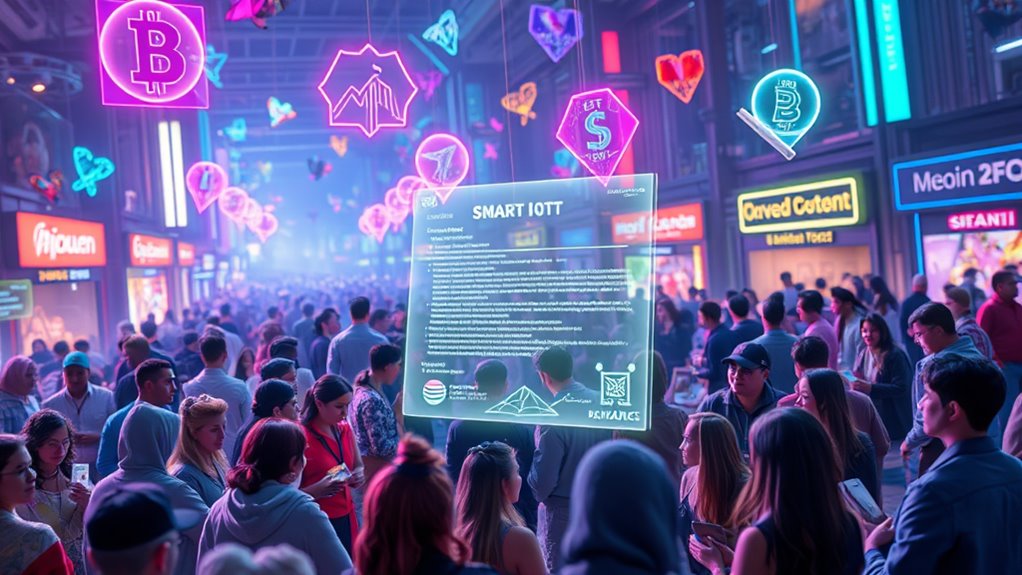
Smart contracts play an essential role in the domain of NFT transactions, serving as the backbone for defining the terms and conditions associated with ownership and transfer. These self-executing contracts automate transactions, guaranteeing transparency and accountability between parties.
They enable features such as royalties for creators, allowing them to earn from secondary sales. Smart contracts also manage the creation and ownership of unique digital assets by encoding properties and metadata directly within the NFT.
By utilizing blockchain technology, these contracts guarantee security and immutability, preventing tampering. Additionally, they facilitate seamless payment handling through cryptocurrencies, providing a decentralized framework that eliminates the need for intermediaries.
Challenges Facing the NFT Market and Regulatory Considerations

The NFT market faces a variety of challenges that impact its development and sustainability. These challenges can hinder user adoption and market stability, creating a complex landscape for participants.
Key issues include:
- Scalability and Performance Issues: High transaction volumes create network congestion, particularly on Ethereum.
- Security Risks: Hacking and smart contract vulnerabilities can lead to financial losses.
- User Experience Concerns: Complicated interfaces deter non-technical users.
- Market Saturation: Many NFTs lack value, resulting in oversupply.
- Regulatory Uncertainty: Evolving laws create confusion for creators and traders. Recent developments in crypto regulations have further complicated this landscape, as exchanges adapt to new legal frameworks.
These challenges necessitate careful consideration, as they influence the future viability and growth potential of NFTs within the metaverse.
Addressing these issues is essential for fostering a stable and thriving NFT ecosystem.
Future Growth Prospects for NFTs in the Metaverse

The future growth prospects for NFTs in the metaverse are influenced by several key factors, including rapid technological innovations and potential user adoption challenges.
As advancements in blockchain and virtual reality enhance user experiences, the demand for NFTs is expected to rise, contributing to a more vibrant digital economy.
However, establishing effective regulatory frameworks will be essential to address concerns surrounding digital ownership and market stability, ultimately shaping the trajectory of NFT growth in this evolving landscape.
Technological Innovations Driving Growth
As technological innovations continue to evolve, they play a vital role in driving the growth of NFTs in the metaverse. Key advancements include:
- Blockchain technology guarantees NFTs are secure and unique, providing tamper-resistant ownership.
- Smart contracts automate transactions, fostering trust and transparency in digital ownership.
- Decentralized storage prevents NFTs from being copied or altered, safeguarding their integrity.
- Augmented Reality (AR) enhances experiences by integrating virtual elements into the real world, expanding NFT use cases.
- AI and machine learning lead to intelligent NFTs that adapt to user preferences, creating dynamic experiences.
These innovations not only bolster the security and functionality of NFTs but also enhance their integration into mainstream platforms, guaranteeing their growing significance in the metaverse economy. Additionally, the decentralized, immutable digital ledger of blockchain technology ensures that ownership records remain transparent and trustworthy, further solidifying the role of NFTs in this digital landscape.
User Adoption Challenges Ahead
User adoption of NFTs in the metaverse faces several significant challenges that could hinder their growth.
Market saturation diminishes the perceived value of NFTs, while cryptocurrency volatility can deter potential investors due to fluctuating asset values. High transaction costs, such as gas fees, add to the complexity and expense of engaging with NFTs.
Additionally, public perception often sees NFTs as a passing trend, limiting wider acceptance. Technical barriers, including the need for advanced hardware and understanding of blockchain, can restrict accessibility.
Moreover, the unclear application of NFTs in everyday life and concerns about environmental impact add to hesitance.
To foster adoption, addressing these challenges through education and improved user experiences will be essential for future growth in the metaverse.
Regulatory Frameworks and Impact
How can regulatory frameworks shape the future of NFTs in the metaverse?
Regulatory measures are essential in defining how NFTs operate within this digital landscape, impacting their growth and acceptance.
Key considerations include:
- Jurisdictional Challenges: Identifying where NFTs are regulated based on user locations.
- Financial Regulations: Compliance needed if NFTs are deemed financial products.
- Privacy and Security Concerns: Regulatory measures can protect user identities and data.
- Technological Neutrality: Regulations apply uniformly across various digital tokens.
- Decentralized Platforms: Oversight is complicated by the nature of decentralized systems.
As regulations evolve, they will dictate market potential and innovation balance, ultimately influencing the trajectory of NFTs in the metaverse.
The challenge remains to foster growth while ensuring consumer protection.
Ethical Implications of NFTs in Digital Spaces
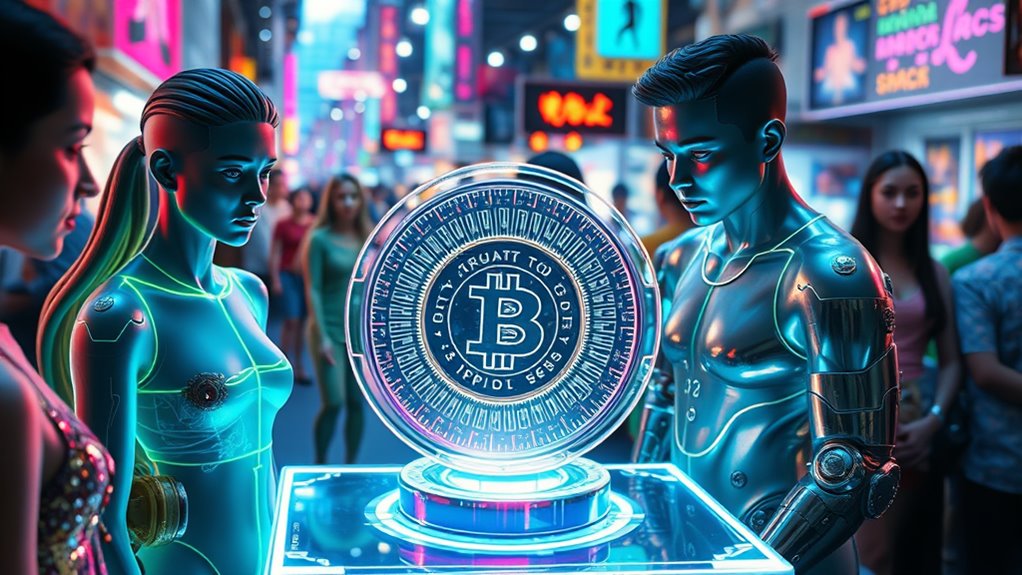
What are the ethical implications of NFTs within digital spaces? The rise of NFTs brings several ethical concerns.
Primarily, the environmental impact of NFT transactions, especially those on energy-intensive platforms like Ethereum, raises questions about sustainability.
The environmental impact of NFTs, particularly on energy-intensive platforms, poses significant sustainability concerns.
Additionally, the prevalence of scams and fraud, such as wash trading, exposes buyers to significant risks. Many NFTs are created from plagiarized works, infringing on artists’ intellectual property rights and undermining their original intent.
Moreover, the lack of consumer protection in NFT markets leaves buyers vulnerable. Brands creating NFTs have ethical responsibilities, including ensuring legal compliance and authenticity, as well as adopting sustainable practices.
These factors collectively highlight the complex ethical landscape surrounding NFTs in digital spaces.
Frequently Asked Questions
How Do I Create My Own NFT in the Metaverse?
To create an NFT in the metaverse, one must select a blockchain, digitize artwork, set up a crypto wallet, choose a marketplace, and mint the NFT using smart contracts for authenticity and ownership verification.
Can NFTS Be Deleted or Destroyed Once Created?
In the vast digital landscape, NFTs can indeed be destroyed. This irreversible act, akin to extinguishing a flame, sends them to inaccessible addresses, rendering them permanently absent while leaving a trace within blockchain records.
What Happens if a Platform Hosting My NFT Shuts Down?
If a platform hosting an NFT shuts down, the NFT remains secure on the blockchain. However, accessing metadata and images may become challenging, emphasizing the importance of decentralized storage and user awareness for safeguarding assets.
Are NFTS Environmentally Sustainable Compared to Traditional Assets?
Ironically, while NFTs promise digital ownership, their environmental impact starkly contrasts traditional assets. High energy consumption and emissions plague NFT transactions, highlighting a paradox where modern technology often undermines sustainability compared to more enduring physical assets.
How Do Taxes Apply to NFT Transactions and Ownership?
Taxes on NFT transactions include capital gains tax upon purchase, trade, or sale. NFTs may be classified as property or collectibles, affecting tax rates. Accurate record keeping is essential for compliance and reporting to tax authorities.
Conclusion
To conclude, NFTs are reshaping digital ownership within the metaverse by providing secure, verifiable assets. As the saying goes, “Where there’s a will, there’s a way.” This indicates that the continued innovation in blockchain technology and smart contracts will likely address current challenges and enhance the role of NFTs. As digital marketplaces evolve, the potential for NFTs to influence identity, economy, and ethics remains significant, paving the way for future growth in this digital landscape.

